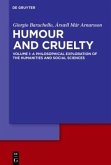The present book addresses the background, rationale, general structure, and particular aims and arguments characterizing our third and last volume about "humor" and "cruelty". A guiding foray is provided into the vast expert literature that can be retrieved in the Western humanities and social sciences on these two terms. Pivotal thinkers and crucial notions are duly identified, highlighted, and examined. Apposite subsidiary references are also included, especially with regard to psychodynamics and clinical psychology, existentialism, feminism, liberalism, Marxism, and representative recent studies in the philosophy of humor and its cognates. The stage is thus set for the exploration and assessment of the conflicts between humor and cruelty unfolding in Part 2 of Volume 3. Being the philosophical terminus of our entire research project, Volume 3 counterbalances, complements, and, occasionally, complexifies the numerous forms of mutual cooperation between humor and cruelty that the preceding Volume 2 had unearthed and discussed.
"Like Aristotle and Dewey, Arnarsson and Baruchello do not define their terms at the outset, but instead they relentlessly pursue the meanings of two ordinary words that everyone vaguely understads to arrive at a critical insight into the concepts these words represent, which are both disparate and interrelated." - Richard Marc Rubin, President, George Santayana Society
Hinweis: Dieser Artikel kann nur an eine deutsche Lieferadresse ausgeliefert werden.
"Like Aristotle and Dewey, Arnarsson and Baruchello do not define their terms at the outset, but instead they relentlessly pursue the meanings of two ordinary words that everyone vaguely understads to arrive at a critical insight into the concepts these words represent, which are both disparate and interrelated." - Richard Marc Rubin, President, George Santayana Society
Hinweis: Dieser Artikel kann nur an eine deutsche Lieferadresse ausgeliefert werden.








